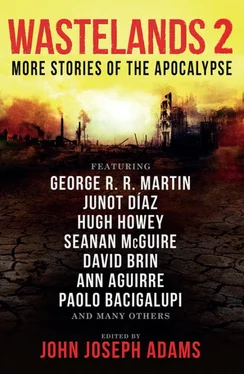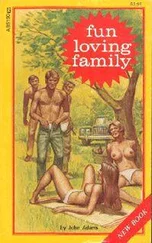He looked to Winters. “Lieutenant, I want my Sandi, and I won’t let you take her away from me. Let’s have a vote.”
Winters nodded.
It was close, very close. The margin was only three votes. Keith had a lot of friends.
But Winters won.
Keith took it calmly. He picked up the cigar box, walked over, and handed it to Winters. Pete was grinning happily, but Winters didn’t even crack a smile.
“I’m sorry, Keith,” he said.
“Yeah,” said Keith. “So am I.” There were tears on his face. Keith was never ashamed to cry.
There was no singing that night.
* * *
Winters didn’t timetrip. He sent men on “search expeditions” into the past, all very carefully planned for minimum risk and maximum reward.
We didn’t get any doctor out of it. Rick made three trips back without coming up with any useful memories. But one of the guys remembered some valuable stuff about medicinal herbs after a trip back to a bio lab, and another jaunt recalled some marginally good memories about electricity.
Winters was still optimistic, though. He’d turned to interviewing by then, to decide who should get to use the chronine next. He was very careful, very thorough, and he always asked the right questions. No one went back without his okay. Pending that approval, the chronine was stored in the new cabin, where Pete kept an eye on it.
And Keith? Keith sang. I was afraid, the night of the argument, that he might give up singing, but I was wrong. He couldn’t give up song, any more than he could give up Sandi. He returned to concert rock the very next evening, and sang longer and harder than ever before. The night after that he was even better.
During the day, meanwhile, he went about his work with a strained cheerfulness. He smiled a lot, and talked a lot, but he never said anything much. And he never mentioned chronine, or timetripping, or the argument.
Or Sandi.
He still spent his nights out by the creek, though. The weather was getting progressively colder, but Keith didn’t seem to mind. He just brought out a few blankets and his sleeping bag, and ignored the wind, and the chill, and the increasingly frequent rains.
I went out with him once or twice to sit and talk. Keith was cordial enough. But he never brought up the subjects that really mattered, and I couldn’t bring myself to force the conversations to places he obviously didn’t want to go. We wound up discussing the weather and like subjects.
These days, instead of his cigar box, Keith brought his guitar out to the creek. He never played it when I was there, but I heard him once or twice from a distance, when I was halfway back to the common house after one of our fruitless talks. No singing, just music. Two songs, over and over again. You know which two.
And after a while, just one. “Me and Bobby McGee.” Night after night, alone and obsessed, Keith played that song, sitting by a dry creek in a barren forest. I’d always liked the song, but now I began to fear it, and a shiver would go through me whenever I heard those notes on the frosty autumn wind.
Finally, one night, I spoke to him about it. It was a short conversation, but I think it was the only time, after the argument, that Keith and I ever really reached each other.
I’d come with him to the creek, and wrapped myself in a heavy woolen blanket to ward off the cold, wet drizzle that was dripping from the skies. Keith lay against his tree, half into his sleeping bag, with his guitar on his lap. He didn’t even bother to shield it against the damp, which bothered me.
We talked about nothing, until at last I mentioned his lonely creek concerts. He smiled. “You know why I play that song,” he said.
“Yeah,” I said. “But I wish you’d stop.”
He looked away. “I will. After tonight. But tonight I play it, Gary. Don’t argue, please. Just listen. The song is all I have left now, to help me think. And I’ve needed it, ‘cause I been thinking a lot.”
“I warned you about thinking,” I said jokingly.
But he didn’t laugh. “Yeah. You were right, too. Or I was, or Shakespeare… whoever you want to credit the warning to. Still, sometimes you can’t help thinking. It’s part of being human. Right?”
“I guess.”
“I know. So I think with my music. No water left to think by, and the stars are all covered. And Sandi’s gone. Really gone now. You know, Gary… if I kept on, day to day, and didn’t think so much, I might forget her. I might even forget what she looked like. Do you think Pete remembers his chick?”
“Yes,” I said. “And you’ll remember Sandi. I’m sure of that. But maybe not quite so much… and maybe that’s for the best. Sometimes it’s good to forget.”
Then he looked at me. Into my eyes. “But I don’t want to forget, Gary. And I won’t. I won’t.”
And then he began to play. The same song. Once. Twice. Three times. I tried to talk, but he wasn’t listening. His fingers moved on, fiercely, relentlessly. And the music and the wind washed away my words.
Finally I gave up and left. It was a long walk back to the common house, and Keith’s guitar stalked me through the drizzle.
* * *
Winters woke me in the common house, shaking me from my bunk to face a grim, gray dawn. His face was even grayer. He said nothing; he didn’t want to wake the others, I guess. He just beckoned me outside.
I yawned and stretched and followed him. Just outside the door, Winters bent and handed me a broken guitar.
I looked at it blankly, then up at him. My face must have asked the question.
“He used it on Pete’s head,” Winters said. “And took the chronine. I think Pete has a mild concussion, but he’ll probably be all right. Lucky. He could be dead, real easy.”
I held the guitar in my hands. It was shattered, the wood cracked and splintered, several strings snapped. It must have been a hell of a blow. I couldn’t believe it. “No,” I said. “Keith… no, he couldn’t…”
“It’s his guitar,” Winters pointed out. “And who else would take the chronine?” Then his face softened. “I’m sorry, Gary. I really am. I think I understand why he did it. Still, I want him. Any idea where he could be?”
I knew, of course. But I was scared. “What… what will you do?”
“No punishment,” he said. “Don’t worry. I just want the chronine back. We’ll be more careful next time.”
I nodded. “Okay,” I said. “But nothing happens to Keith. I’ll fight you if you go back on your word, and the others will too.”
He just looked at me, very sadly, like he was disappointed that I’d mistrust him. He didn’t say a thing. We walked the mile to the creek in silence, me still holding the guitar.
Keith was there, of course. Wrapped in his sleeping bag, the cigar box next to him. There were a few bags left. He’d used only one.
I bent to wake him. But when I touched him and rolled him over, two things hit me. He’d shaved off his beard. And he was very, very cold.
Then I noticed the empty bottle.
We’d found other drugs with the chronine, way back when. They weren’t even guarded. Keith had used sleeping pills.
I stood up, not saying a word. I didn’t need to explain. Winters had taken it all in very quickly. He studied the body and shook his head.
“I wonder why he shaved?” he said finally.
“I know,” I said. “He never wore a beard in the old days, when he was with Sandi.”
“Yes,” said Winters. “Well, it figures.”
“What?”
“The suicide. He always seemed unstable.”
“No, Lieutenant,” I said. “You’ve got it all wrong, Keith didn’t commit suicide.”
Winters frowned. I smiled.
“Look,” I said. “If you did it, it would be suicide. You think chronine is only a drug for dreaming. But Keith figured it for a time machine. He didn’t kill himself. That wasn’t his style. He just went back to his Sandi. And this time, he made sure he stayed there.”
Читать дальше












